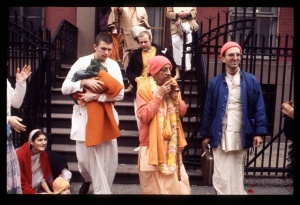SB 8.1.29

A.C. Bhaktivedanta Swami Prabhupada
TEXT 29
devā vaidhṛtayo nāma
vidhṛtes tanayā nṛpa
naṣṭāḥ kālena yair vedā
vidhṛtāḥ svena tejasā
SYNONYMS
devāḥ—the demigods; vaidhṛtayaḥ—the Vaidhṛtis; nāma—by the name; vidhṛteḥ—of Vidhṛti; tanayāḥ—who were the sons; nṛpa—O King; naṣṭāḥ—were lost; kālena—by the influence of time; yaiḥ—by whom; vedāḥ—the Vedas; vidhṛtāḥ—were protected; svena—by their own; tejasā—power.
TRANSLATION
O King, in the Tāmasa manvantara the sons of Vidhṛti, who were known as the Vaidhṛtis, also became demigods. Since in course of time the Vedic authority was lost, these demigods, by their own powers, protected the Vedic authority.
PURPORT
In the Tāmasa manvantara there were two kinds of demigods, and one of them was known as the Vaidhṛtis. The duty of the demigods is to protect the authority of the Vedas. The word devatā refers to one who carries the authority of the Vedas, whereas Rākṣasas are those who defy the Vedic authority. If the authority of the Vedas is lost, the entire universe becomes chaotic. Therefore, it is the duty of the demigods, as well as kings and aides of governments, to give full protection to the Vedic authority; otherwise human society will be in a chaotic condition in which there cannot be peace or prosperity.